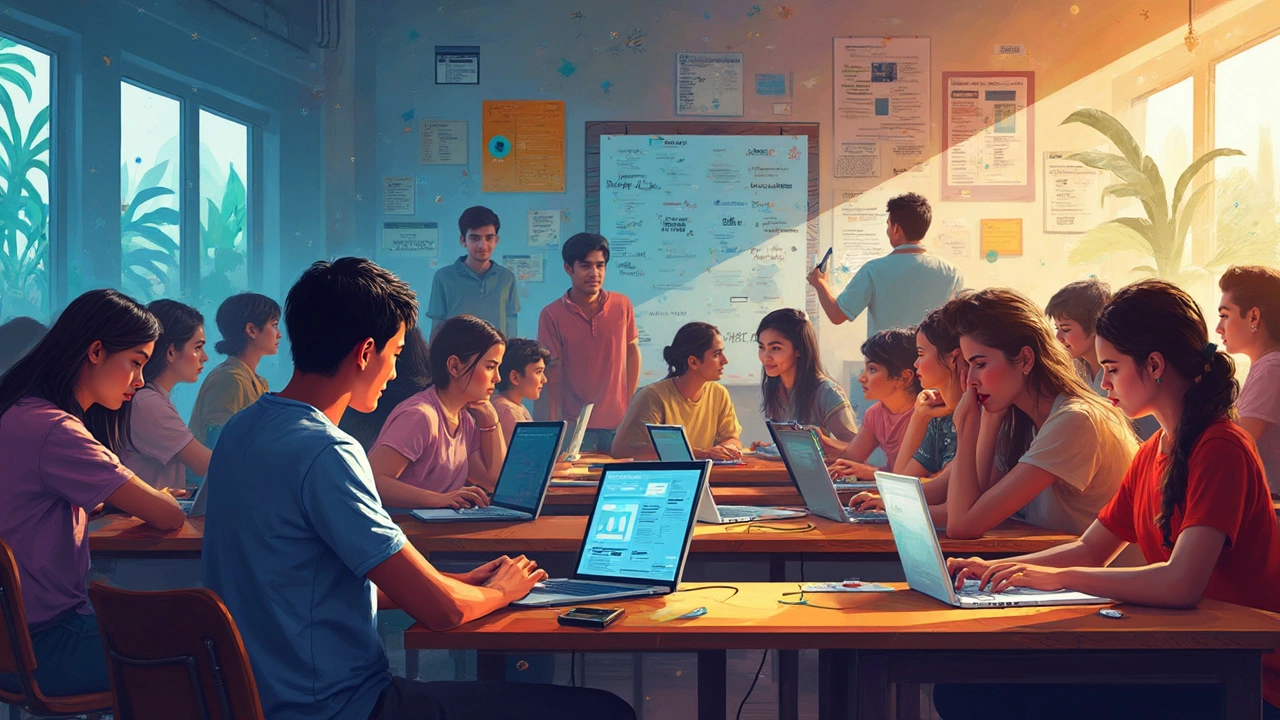Everyone wants to know the magic number. How long does it actually take to learn to code? You’ve probably seen ads saying you’ll be job-ready in three months, or maybe even 30 days. That’s a nice fantasy, but let’s get real for a minute—learning to code is a marathon, not a sprint.
If you’re hoping to land your first tech job, most people need at least six months of steady practice. That’s if you’re studying almost every day, not just watching tutorials, but typing real code, making mistakes, and looking up error messages like everyone else starting out. For folks dabbling part-time or juggling other commitments, it can easily stretch to a year or more. And if you’re teaching yourself from scratch without any classes? You’ll probably need extra grit and patience. But don’t worry, you don’t need to be a math genius or a computer whiz—persistence gets you further than talent here.
With all the hype out there, it’s easy to start thinking you’re behind if you’re not building your own app by week two. Truth is, almost everyone struggles at the beginning. It’s completely normal to stare at error messages and wonder if you’re cut out for this. Stick with it. You’ll be surprised what clicks after a few months of daily, messy attempts.
- Busting the 'Learn to Code Fast' Myth
- How Different Paths Change Your Timeline
- What Really Slows You Down (or Speeds You Up)
- Realistic Milestones: When Does It Click?
- Tips to Learn Faster and Smarter
- How to Know When You're Actually 'There'
Busting the 'Learn to Code Fast' Myth
If you’ve scrolled through Instagram or watched YouTube lately, you’ve probably seen those promises: “Become a coder in a month!” The cold, hard truth? That’s almost never how learning code works. Even the best bootcamps and online courses can’t rewire your brain overnight. Real talk: most people who get a job as a developer spend learn to code time anywhere from 500 to 1000 hours just on the basics.
Let’s be specific about what “knowing how to code” actually means. You’re not just memorizing a bunch of commands. You’re learning to think in a new way—breaking down problems, searching for answers, fixing bugs, and trying, failing, and trying again. You can’t speed-run that like a video game. Even Mark Zuckerberg took years of experimenting before launching Facebook!
Check out these numbers that show how long real people spend learning to code:
| Learning Path | Typical Time to Basic Job-Readiness |
|---|---|
| Full-Time Coding Bootcamp | 3-6 months |
| Part-Time Self-Study (Evenings/Weekends) | 9-18 months |
| University Degree | 3-4 years |
It’s important to remember: those ‘accelerated’ timelines only count the time you’re actively focused, not the hours spent just watching others code. Perseverance matters. Most new coders quit in the first six months, mainly because they expected it to feel easy.
If you want to make real progress, forget TikTok promises. Instead, focus on:
- Coding every day—even for 20 minutes beats 2 hours once a week.
- Building tiny projects instead of just consuming videos.
- Getting comfortable googling error messages (every professional does this, no shame).
No shortcut replaces hours at the keyboard and messy, hands-on problem solving. If you stick with it, you’ll notice steady progress—and you won’t care how fast anyone else claims to be going.
How Different Paths Change Your Timeline
It’s easy to get lost comparing your learning speed with others, but different routes to learning code can mess with your timeline—sometimes big time. Ever notice how some folks go from zero to junior developer in six months while others need closer to two years? It’s not just talent; it’s the path you choose.
If you go down the classic college route and major in computer science, expect to spend four years plugging away at lectures, projects, and theory. Sure, you’ll walk out with a degree, but don’t expect to know everything—most grads still need to learn a lot on the job.
Then you’ve got bootcamps. These are intense, usually 12 to 16 weeks, and they cram a ton of practical stuff into a short time. It can be brutal, with long nights and coding marathons, but if you’re focused, you can come out job-ready—especially if you’re gunning for web development. Just know: bootcamps are not magic. The average grad often spends a few months after finishing, building projects and applying to jobs before landing that first role.
Now, what if you’re teaching yourself? This self-driven track is the most flexible, but also the slowest for most people. If you’re squeezing in an hour after work or watching YouTube tutorials on weekends, things will take longer. A self-taught coder usually takes at least a year to get comfortable enough to build real-world apps or interview for their first job.
Here’s a quick breakdown of common learning paths and rough timelines:
- Bootcamps: About 3-6 months (full-time), plus a few months to job hunt
- College Degree: 4 years, often followed by more self-study for real-world skills
- Self-Taught (Part-Time): 1-2 years, depending on consistency and practice
The choice really comes down to your goals, budget, and how fast you want to get there. If you want the fastest route to learn to code and you can fully commit, bootcamp is tough to beat. But no matter which path you choose, real progress comes from writing tons of code, not just soaking up information. Practice is what builds those skills.
What Really Slows You Down (or Speeds You Up)
If you ask people how long it took them to learn coding, the numbers are all over the map. Some zoom ahead. Others get stuck. Why? There are a few things that matter way more than how smart you are.
Your learning method is a big deal. If you just binge online videos but never build your own stuff, your progress basically stalls. People who start basic projects—even simple ones like calculators and to-do lists—move much faster. Don’t just watch; do. The hands-on mess is where you really learn.
How much time you can carve out for consistent practice matters too. According to a Stack Overflow survey, folks who spent at least 10 hours a week on coding tasks reached their first "job ready" milestone in 6-12 months. But those who squeezed in just an hour or two a week often took twice as long, or more.
| Time Spent Per Week | Avg. Time to Land Entry-Level Role |
|---|---|
| 10+ hours | 6-12 months |
| 5 hours | 12-18 months |
| 1-2 hours | 2+ years |
What else speeds things up? Getting feedback. Whether it’s from classmates, online communities, or a mentor, having someone point out what you’re missing helps you level up way faster.
But here’s what drags things out:
- Trying to learn everything at once (HTML, JavaScript, Python, databases, and Git all in the same week—don’t do it)
- Never asking questions when stuck. Googling is good, but sometimes it’s faster to just ask a real human.
- Not taking breaks. Weirdly, marathon sessions usually leave you more burnt out and confused next time.
- Comparing yourself (the beginner) to people online who’ve been coding for years.
One huge tip: Pick one language or stack—say, JavaScript for web stuff—and stick with it for a while. Jumping around slows you down. And the most important thing? Steady, imperfect practice wins the race when you learn to code.

Realistic Milestones: When Does It Click?
So, when do things actually start making sense? Most beginners hit a few key milestones on their way to becoming comfortable with code. These aren’t just random feelings—there’s a real pattern that shows up when you talk to people who made it through.
The first big marker is writing your own code without copying it from the internet. Usually, folks reach that after about 2-3 weeks of daily practice, even if it’s just a tiny calculator or guessing game. Around month two or three, you’ll start to understand how functions, loops, and variables work together—this is when solving simple problems stops feeling like solving a puzzle with missing pieces.
Here’s what the path usually looks like for someone learning at a steady pace (like an hour or two most days):
- Week 1-4: Understanding basics (variables, conditions, simple syntax). Lots of copy-paste from tutorials.
- Month 2-3: Building short projects, reading error messages without panicking, Googling for solutions becomes second nature.
- Month 4-6: Comfort with functions, simple data structures (arrays, lists), building apps that do something useful for you.
- Month 7+: Reading other people’s code, starting to tinker with frameworks or more complex topics (APIs, databases), fixing your own bugs.
Stack Overflow ran a survey showing that most people who end up working as developers took between 6 to 12 months to reach a job-ready skill level, assuming a few hours a day. Bootcamp students are usually coding 20+ hours a week, which helps them finish faster, but even then, it’s rarely less than 12 weeks before things click at a deeper level.
| Milestone | Usual Timeframe |
|---|---|
| First script without copying | 2-4 weeks |
| First real project (e.g. to-do app) | 2-3 months |
| Confident problem solving | 4-6 months |
| Reading & understanding others’ code | 6-9 months |
The most important thing? Celebrate these wins instead of stressing about the finish line. When you build something that actually works, even a tiny project, it unlocks a whole new level of motivation. That’s when learning to code really starts to feel real. By now, you’re doing more than surviving—you’re actually creating and figuring things out for yourself. That’s when learn to code isn’t just some idea; it’s something you can actually do.
Tips to Learn Faster and Smarter
If you want to cut down your learning curve, don’t just grind away for endless hours. Smarter beats longer, every time. Here’s how to make your coding journey a lot less painful and a lot more productive.
- Build real projects early. The biggest mistake beginners make? Sticking with tutorials for too long. You only start getting it once you try building something from scratch—maybe a simple to-do list or a basic weather app. This is where you face real problems and actually start learning.
- Practice daily in small chunks. One hour every day works better than a seven-hour binge on Sunday. Coding is a skill, like playing an instrument. Repetition wires it into your brain, even if it doesn’t feel like you’re improving at first.
- Don’t memorize, learn to Google. The best programmers aren’t memory machines. They know how to find answers quickly. Get comfortable searching docs, Stack Overflow, and GitHub for help. This is a real skill—work on it.
- Mix reading and doing. Read the docs or a guide, but always try what you’re learning right away. Copy/pasting isn’t cheating—it helps you see how things fit together. But tweak the code, break it, and fix it. That’s how stuff sticks.
- Go public with your work. Share on GitHub or social media, even if your code looks messy. When you know someone might see it, you actually try harder—and you might even get feedback from more experienced devs.
- Find a community. This could mean a Discord group, a free online course forum, or a local meetup. Having others on the same path makes it way easier to stay motivated and get unstuck when you hit a wall.
If you really want to learn to code efficiently, focus on the tough parts you’re avoiding. Maybe it’s debugging, maybe it’s reading documentation, or maybe your eyes glaze over with new terms. That’s where growth happens. And don’t forget—everyone feels lost sometimes, even people with years on the job.
How to Know When You're Actually 'There'
This is the moment everyone’s waiting for: that point where you can finally say, “Yeah, I can code.” Figuring out when you’ve hit that mark is tricky, especially since there’s always more to learn. But there are some signals you’re ready, whether your goal is a new career or just building your own stuff.
If you can take an idea—say, a simple to-do list app—and actually turn it into working code that runs without following step-by-step guides, that’s a huge win. Following along with tutorials is important at first, but you need to break free eventually. When you start Googling solutions and piecing them together yourself, you’re on the right track.
Another clear sign? You can read other people’s code (open source projects on GitHub are great for this) and at least figure out what’s going on without panic. You don’t need to understand every detail, but you shouldn’t feel totally lost either.
Try these mini-tests to check if you’re really “there”:
- You can build small projects from scratch—no copy-paste, no hand-holding.
- You can answer basic coding questions or explain concepts to someone brand new.
- You know how to debug: when you break something, you can usually fix it—maybe not fast, but you don’t get stuck forever.
- You’re comfortable with documentation. Seriously, the ability to read docs saves hours.
- You feel confident solving coding interview problems at the beginner level (LeetCode Easy, for example).
Survey data from sites like Stack Overflow shows most junior developers have about 400-800 hours of hands-on coding before landing their first real gig. That sounds like a ton, but spread over six to twelve months of regular practice, it adds up fast.
Here’s the secret—almost nobody feels 100% ready when they start a real project or their first job. If you can handle the basics of learn to code challenges on your own and aren’t afraid to figure things out when you’re stuck, you’re closer than you think. Don’t wait for that magical feeling of being “done.” The finish line always moves as you grow, but every working project or hurdle you clear is proof you’re already a coder.


